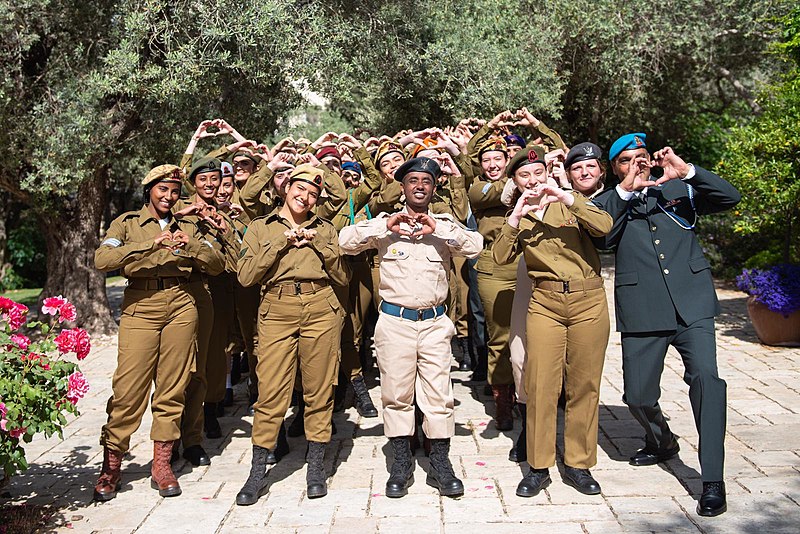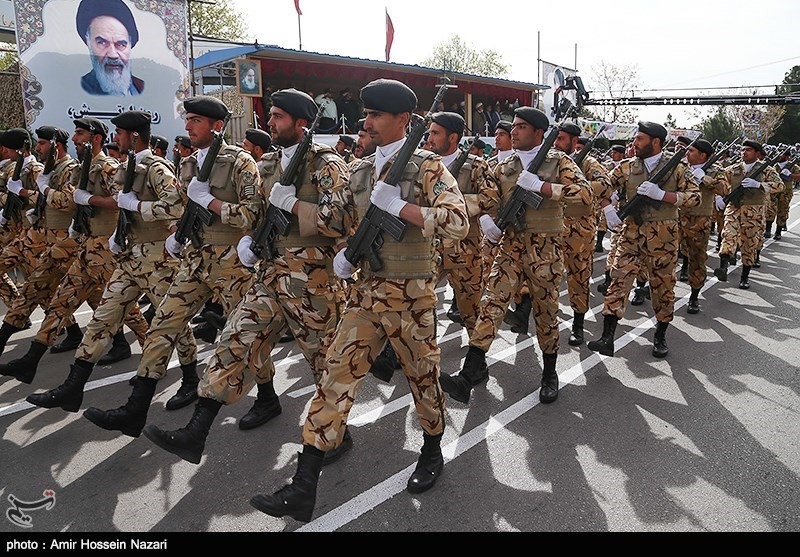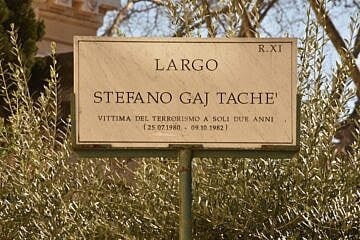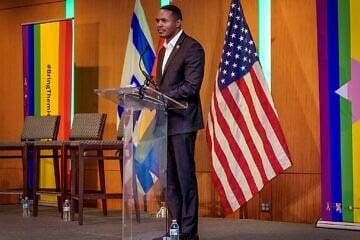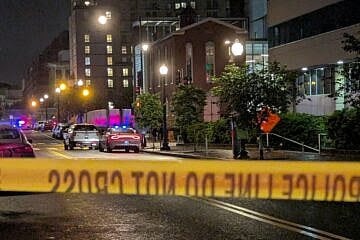It is a clear abuse of power when editors let their personal political views dictate content decisions.
Samuel Weisz
(JNS)
On many campuses across the United Kingdom, including at the University of Exeter, where I study, the prevailing “campus norm” regarding Israel is overwhelmingly one-sided. Marked by protests filled with extreme anti-Israel rhetoric and persistent propaganda campaigns, there’s little space or tolerance for alternative viewpoints. Attempts by pro-Israel students to engage in campus discussion, such as through the student newspapers, are frequently stonewalled.
At Exeter, for instance, the Exeposé, like other student papers across the United Kingdom, seems to have shifted from being an impartial platform for students to serving as an ideological mouthpiece for anti-Israel activists. Its coverage of Israel-related issues is consistently skewed, and when pro-Israel students try to contribute alternative viewpoints, we’re either ignored or pressured to conform. Recently, some of the content has felt like thinly veiled attacks on Zionists, disguised as serious reporting, but lacking in journalistic integrity.
When I approached a member of the Exeposé editorial team to propose an article on the importance of pro-Israel voices on campus, I was told that Israel-Palestine wasn’t a topic they were looking to cover. They said that despite publishing multiple articles on the subject since the terror attacks on Oct. 7, 2023, all with a clear anti-Israel stance. And it left me questioning whether the editorial process welcomes diverse viewpoints.
It is a clear abuse of power when editors let their personal political views dictate content decisions, which raises questions about the alignment with university policies on expression and inclusivity. While editorial discretion is important, editors should focus on the relevance of a topic, its timeliness, grammar and sources, not on silencing the voices of students who differ in opinion.
Articles containing inflammatory and unsubstantiated accusations are being presented as fact in student newspapers without any meaningful challenge or verification. One recent piece published by the Exeposé was intended to discuss how the Israel-Palestine conflict is “shaping student experiences.” The goal was to talk to students of various religious and cultural groups to examine campus sentiment and identify effects related to the conflict. However, several interviewees hijacked this opportunity, using it to spread hate and misinformation.
One such baseless claim made in the piece by anti-Israel students was that they are “spied on and monitored” by “CAMERA-affiliated” students to silence their views. (CAMERA, the Committee for Accuracy in Middle Reporting and Analysis, is a nonpartisan organization that promotes accurate media coverage of the Middle East.) These and similar claims were published without further questioning or context, nor was there an opportunity to respond by CAMERA representatives on campus. This would have revealed that all of the accusations in the article are incorrect. We, the pro-Israel students on campus, have been much more welcoming to opposing viewpoints than the treatment we have received. We have made every effort to engage in dialogue with students who hold opposing views, inviting them to events and trying to create spaces for discussion and understanding.
What’s more concerning is the personal nature of these accusations. The interviewees constantly targeted “CAMERA-affiliated students,” but there are only two of us on campus. These statements are not only false but a direct attack on individual students, without verification or giving us any chance to respond. This pattern doesn’t just harm those targeted; it damages the credibility of the student newspaper and undermines the campus’s ability to engage in fair and open discussion.
In an article published about yellow ribbons that were put up on campus for the Israeli hostages, the Palestine Society, a group on campus, was given a proper chance to comment. When asked about hostages in Gaza, they said: “We continue to stand up for Palestinian liberation and will not stop until it is met.” No scrutiny or context was provided, almost as if the journalists agree with their belief that kidnapping innocent Israelis is a legitimate tactic.
In the aforementioned article about student experiences related to the Israel-Palestine conflict, a poll about student sentiment was supposedly conducted. I serve on the committees of both the Israel Society and the Jewish Society on campus, neither of which was asked to participate. Furthermore, all results were presented in large increments—25% or 50%—hinting at a questionable sample size. No information about the methodology of the poll or which groups were consulted was offered.
Student newspapers have a vital role to play in shaping fair and informed campus conversations. But when it comes to Israel, too many have fallen into patterns of exclusion and unchecked bias. Cases like The McGill Daily’s refusal to publish articles “supportive of Zionism,” or The Harvard Crimson’s support of BDS show that this is not accidental, but a deliberate failure to foster fair, informed campus discussions on complex issues like Israel.
To restore trust and promote genuine dialogue, these papers must recommit to basic principles of journalism: clearly distinguishing opinion from news; fact-checking claims, especially serious accusations; providing context and scrutiny to all sides; and offering a timely right of reply to those targeted. Taking even a few of these steps could drastically improve the fairness and accuracy of student newspapers, fostering a healthier and more open campus debate.
Image: Newspapers. Credit: brotiN biswaS/Pexels
“The victims range from 25 to 88 years old, eight female and seven male,” according to the FBI.
(JNS)
The number of identified victims in Sunday’s antisemitic attack in Boulder, Colo., has increased to 15 people and one dog, the Federal Bureau of Investigation announced Wednesday.
“The victims range from 25 to 88 years old, eight female and seven male,” the FBI wrote.
The accused perpetrator is a 45-year-old Egyptian, “who had overstayed his visa in the United States and remained in the country unlawfully since 2022,” according to the Trump administration.
Kristi Noem, U.S. secretary of homeland security, announced on Wednesday that she directed federal agencies to “ramp up” crackdowns on those who overstay their visas in response.
Image: Pearl Street Mall in Boulder, Colo. Photo by Brylie Oxley via Wikimedia Commons.
If Trump is serious about preventing war and bloodshed in the Middle East, he must insist that any agreement with Iran’s mullahs include no centrifuges or uranium enrichment of any kind, and no support for Tehran’s terror proxies
Khaled Abu Toameh
(JNS)
As talks between Washington and Tehran are underway to reach an agreement on Iran’s efforts to acquire nuclear weapons, even if a deal is reached, unless it features “anywhere, anytime” inspections, to which Iran has never agreed, Iran will secretly continue to develop nuclear weapons and cheat, cheat, cheat.
If such a deal is reached, Iran also is not going to stop its financial and military support for its terror proxies in the Middle East, including Hamas and Palestinian Islamic Jihad (PIJ), Hezbollah in Lebanon and the Houthi militia in Yemen. Iran, in short, is not going to abandon its declared goal of obliterating the “Zionist entity” (“the Little Satan”) or the United States (“the Great Satan”).
U.S. President Donald J. Trump said on May 28 that he believes his administration is “very close to a solution” regarding a nuclear agreement. “Right now, I think they want to make a deal,” Trump said. “And if we can make a deal, I’d save a lot of lives.”
These are the main reasons why an agreement regarding Iran’s nuclear ambitions is not enough.
The Iranian regime’s ongoing effort to acquire nuclear weapons is a huge problem, as are its repeated demands to enrich uranium (whatever could go wrong?) and threats to destroy Israel—especially with Iran’s proxy terror groups that also seek to destroy Israel.
If Trump is serious about preventing war and bloodshed in the Middle East, he must insist that any agreement with Iran’s mullahs include no centrifuges or uranium enrichment of any kind, and no support for Tehran’s terror proxies.
If something could possibly go wrong, unfortunately it will—leaving Trump with the legacy of delivering yet another laughably fake peace deal and of his presidency being another failure like that of Barack Obama.
Were it not for Iran’s financial and military support, Hamas, Palestinian Islamic Jihad, Hezbollah and the Houthis would not have been able to launch thousands of rockets, ballistic missiles and drones at Israel over the past 20 months.
Halting or limiting Iran’s uranium enrichment may be a positive development, but what about the hundreds of millions of dollars and the weapons it sends to its terror proxies? The Trump administration must demand an immediate halt to the funding and arming of the Iran-backed Islamist terror groups. Furthermore, it must demand that Iran’s leaders stop calling for the annihilation of Israel.
The same is true for the leaders of Qatar (for instance here and here), as well Qatar’s personal insults against Trump himself.
As Trump was voicing optimism regarding the prospects of reaching a nuclear deal with the Iranian regime, Ali Akbar Velayati, senior adviser to Iran’s Supreme Leader Ayatollah Ali Khamenei, received a delegation of Hamas and PIJ officials in Tehran and discussed with them “the latest developments in the region, especially the situation in Palestine and the Gaza Strip.”
Iranian and Palestinian media outlets quoted Velayati as “assuring” the Hamas and PIJ officials that “the Zionist entity is doomed to disappear.” Hamas and PIJ, the second largest Iran-backed terror group in the Gaza Strip, participated in the Oct. 7, 2023 invasion of Israel. At least 1,200 Israelis were murdered and thousands wounded on that day. Another 251 Israelis and foreign nationals were kidnapped to the Gaza Strip, where 58 remain in captivity (only 20 are believed to be alive).
Velayati also “affirmed Iran’s solidarity with the [Palestinian] resistance groups and praised the victories of the Palestinian resistance [against Israel] as a rare achievement in the history of Islam,” according to media reports.
The meeting between Velayati and the Hamas and PIJ representatives shows that the Iranian regime has no intention to turn its back on its terror proxies, notwithstanding any possible future nuclear agreement with the United States. The opposite is true. Velayati reassured the Palestinian terror leaders that the Iranian regime is determined to continue supporting them, to help them achieve their goal of murdering Jews and eliminating Israel. When the Iranian official talks about the “resistance,” he is referring to terrorism against Israel, including the Oct. 7 massacre.
Velayati’s talk about the destruction of the “Zionist entity” shows that the Iranian regime does not intend to abandon its dream of wiping Israel off the map, and the United States as well.
In the past few years, Khamenei has repeatedly called for the destruction of Israel and America. He was also quick to praise the Oct. 7 massacre as a “logical and legal” action.
It is wrong and unrealistic to assume that Khamenei and his regime, if and when they sign a nuclear agreement with the Trump administration, would abandon their dream of destroying Israel and America. The nuclear agreement the Iranian regime signed with the Obama administration in 2015 did not stop the mullahs in Tehran from providing financial and military aid to the Islamist terror groups in the Middle East. That agreement, known as the Joint Comprehensive Plan of Action (JCPOA), also did not see Iran’s leaders change their minds about destroying Israel.
Iran’s support for the Palestinian terror groups, Hezbollah and the Houthi militia has brought death and destruction on Palestinians, Lebanese and Yemenis. Iran’s regime is a threat not only to Israel, but also to the United States.
“Iran’s openly stated goal is to destroy Israel, but the broader game is its perception of the United States as the ‘Great Satan,’” wrote Shishir Gupta, executive editor of the Hindustan Times, in April 2023.
“Iran’s strategy involves orchestrating various terrorist groups in the Middle East, with multifaceted objectives. Firstly, it seeks to dominate the Islamic world in the region, asserting its influence over other nations. Simultaneously, it aims to strike at the credibility of the United States, a long-standing adversary in Iranian foreign policy.”
The Trump administration would do well to take these issues into consideration before signing any agreement with Iran. Such an agreement, if reached, unfortunately will not mean that the Iranian regime has become America’s friend. As long as the mullahs continue to wish for the destruction of Israel and America, and to back Islamist terror groups, they should be treated as dangerous enemies of both Israel and the United States.
Originally published by the Gatestone Institute.
Those who attend the June 7 march will fuel the catastrophic antisemitic surge that began after the Hamas attacks on Oct. 7, 2023 and recall other acts of Jew-hatred.
Fiamma Nirenstein
(JNS)
After decades of tireless effort, the haters of Israel, who prefer to call themselves defenders of the Palestinians, have finally been rewarded. On June 7, they will hold a rally in Rome, promoted by several of Italy’s political groups, including the Partito Democratico, the Five Star Movement and the Alleanza Verdi e Sinistra. The march is nothing more than the latest chapter in an old story, as today’s accusations of genocide and colonialism are just new labels placed on postwar antisemitism. As always, when antisemitism spikes, it signals a deeper existential crisis in the West.
Whenever a civilization loses its way, it blames the Jews. The world, threatened by Russian President Vladimir Putin and China, destabilized by President Donald Trump and paralyzed by Islamic terrorism it dares not name, lashes out instead at Israel, Zionism, Israeli Prime Minister Benjamin Netanyahu and the Jews. It bases this hatred on a mountain of lies—lies that incite murder while willfully ignoring the violent criminals it defends.
That public square, including the so-called moderate left that asks Israel to stop defending itself, will bear moral responsibility for the wave of Jew-hatred now staining every corner of the globe. “Occupation” is the go-to slogan, one that is entirely unfounded. What we are witnessing is the containment of a territory until it no longer poses the catastrophic threat Hamas has proven to be.
The word Zionist has been twisted into an insult, paired with “colonialist,” as though Jews were not the only indigenous people to maintain a spiritual and historical bond with their land, and return to it through fully legal international processes, even offering half of it to their most violent enemies.
Throughout the centuries, Jews were accused of deicide. Now, as if wrapped once again in a burial shroud, they’re falsely charged with killing children in Gaza for pleasure—a blood libel reborn. The Nazis claimed that Jews were imperialist capitalists, manipulators, vermin to be exterminated. Shouting it in the streets didn’t make it true. Nor did it diminish the horror of the Shoah.
This protest movement is wrong. It must revisit the false casualty numbers (see Honest Reporting or the Henry Jackson Society for factual numbers), confront the monstrous crimes of Hamas and acknowledge that Hamas used civilian tunnels for terror, not for protecting the population. It should investigate stolen humanitarian aid, repurposed to build instruments of death.
Those who attend the rally will be fueling a catastrophic antisemitic surge—one that was emboldened by the Hamas-led terrorist attacks in southern Israel on Oct. 7, 2023. Hamas gloats, “We raped, burned, dismembered Jews—thanks to your support, we’ll do it again across the globe.” Attending this protest means siding with that ideology.
Hamas’s fatality statistics are false. At least 75% of those killed were adult males, many affiliated with Hamas or another terrorist group. Some of those people died from illness or old age. Israel has done everything possible to minimize harm, despite fighting in a terrain where rocket launchers, explosives and death squads were hidden in homes, schools and hospitals.
By March, Israel had sent 975,000 tons of food, 50,000 tons of water and 25,000 tons of medicine to the Gaza Strip. This was an unprecedented case of a country at war providing aid to its enemy. From day one, however, Hamas seized those supplies at gunpoint for their own benefit.
Israel’s demands are simple: Surrender your weapons, return the hostages. That’s Netanyahu’s “terrible” condition. Israel is fighting a war of survival. The rift between right and left has not undone its democracy.
Israel is unforgivable, they say, because it defeated Hezbollah, pushed back the Houthis and Iran, helped topple Syria’s longtime dictator Bashar Assad and, of course, crippled Hamas. But heaven forbid that it wins this war—one that could rid the world of a terrorist force like ISIS or Al-Qaeda; one that executes dissidents, enslaves women, kills homosexuals, amasses billions of dollars and in builds 750 kilometers of tunnels that never provided shelter to a single Gazan woman or child and that tortures its hostages.
Those who attend the June 7 rally will join the ranks of the shopkeepers who throw out Jewish customers, hoteliers who post “Jews not welcome,” festival organizers who blacklist Israeli artists, those who threaten via social-media and, quite possibly, the next shooter. Like the one who killed 2-year-old Stefano Gaj Taché outside a Rome synagogue on a Jewish holiday in 1982, or the lone gunman who last week shot and killed Yaron Lischinsky, 30, and Sarah Milgrim, 26, who worked at the Israeli embassy in Washington, D.C.
Baby Ravid Chaim Gez was just buried in Israel, having lived for only two weeks. His mother, Tzeela Gez, was murdered by a Palestinian terrorist while on her way to the hospital to give birth. The family donated her organs so that others could live.
Thousands of Israel Defense Force soldiers are only 18 or 19 years old. Nearly 1,000 have died defending a humanitarian democracy under siege. Israel is fighting to defeat terrorism to protect its citizens and the world. Do your part, do not attend the June 7 protest.
Image: A plaque outside of Rome’s Great Synagogue pays tribute to 2-year-old Stefano Tache who was murdered there in 1982. Credit: Christian Michelides via Wikimedia Commons.
“After being shot, Sarah Milgrim struggled to crawl away,” wrote Rep. Ritchie Torres (D-N.Y.). “Elias Rodriguez walked over and executed her at point-blank range. This is the antisemitic demon the DSA has chosen to lionize.”
Izzy Salant
(JNS)
The Democratic Socialists of America’s Liberation Caucus on Tuesday praised Elias Rodriguez, 31, the suspected gunman in the killing of Israeli embassy staffers Yaron Lischinsky, 30, and Sarah Milgrim, 26, in Washington, D.C., and called for Rodriguez’s freedom.
“Elias Rodriguez’s targeted attack on two Israeli diplomatic staff on May 21, 2025, was a legitimate act of resistance against the zionist state and its genocidal campaign in Gaza,” reads the beginning of a statement from the Free Elias Rodriguez Organizing Committee.
The DSA Liberation Caucus wrote that this was an “excellent statement that we are proud to add our name to,” adding “Free Elias Rodriguez and all political prisoners.”
Rep. Ritchie Torres (D-N.Y.), a long proponent of Israel, condemned the DSA—whose members include Reps. Alexandria Ocasio-Cortez (D-N.Y.) and Rashida Tlaib (D-Mich.)—for their “grotesque” statement.
“The Democratic Socialists of America (DSA) has publicly endorsed the barbaric murder of a young Jewish and Israeli couple,” Torres wrote. “Its call to ‘Free Elias Rodriguez’ is a grotesque attempt to glorify a cold-blooded murderer.”
“After being shot, Sarah Milgrim struggled to crawl away,” he added. “Elias Rodriguez walked over and executed her at point-blank range. This is the antisemitic demon the DSA has chosen to lionize.”
DSA did not respond to a JNS request for comment on whether the statement of its Liberation Caucus represented the feelings of the organization as a whole.
Lischinsky and Milgrim were shot and killed on the evening of May 21 outside the Capital Jewish Museum in Washington, D.C., where they were attending an American Jewish Committee event. Yechiel Leiter, Israeli ambassador to the United States, revealed they were a couple about to be engaged. Milgrim was laid to rest in Kansas on Tuesday.
While being taken into custody, Rodriguez was filmed shouting, “free, free Palestine.” According to an FBI affidavit, Rodriguez claimed he “did it for Gaza.”
On May 22, fifteen members of Israel’s parliament signed a letter to U.S. Attorney General Pam Bondi requesting that she pursue the death penalty against Rodriguez.
Image: Rep. Ritchie Torres (D-N.Y.) speaks at We Belong: Pride and Solidary Event hosted by the Embassy of Israel in Washington, D.C., on June 25, 2024. Credit: tedeytan via Wikimedia Commons.
‘Israel may change tack on aid groups in Gaza’
Jerusalem may let NGOs operating in the enclave take charge of non-food assistance.
JNS Staff
(JNS)
As international pressure mounts to allow more supplies to enter Gaza, Israel appears to be changing course and may let aid groups operating in the enclave remain in charge of non-food assistance while leaving food distribution to a newly established United States-backed group, according to a letter obtained by the Associated Press.
The development indicates Jerusalem may be walking back from its plans to tightly control all aid to Gaza and prevent aid agencies long established in the territory from delivering it in the same way they have done in the past, the news agency reported on Saturday.
In the past, Hamas has stolen much of the aid.
Israel blocked food, fuel, medicine and other supplies from entering Gaza for almost three months. It resumed aid on May 20, when five United Nations trucks carrying supplies, including baby food, entered the Gaza Strip via the Kerem Shalom Crossing, the Israeli military confirmed.
The letter, dated May 22, is from Jake Wood, the head of the Israel-approved Gaza Humanitarian Foundation or GHF, and is addressed to COGAT, the Israeli Defense Ministry unit in charge of transferring aid to the territory.
It said that Israel and GHF had agreed to allow non-food humanitarian aid—from medical supplies to hygiene items and shelter materials—to be handled and distributed under an existing system, which is led by the United Nations. U.N. agencies have so far provided the bulk of the aid for Gaza.
The foundation would still maintain control over food distribution, but there would be a period of overlap with aid groups, the letter said.
“GHF acknowledges that we do not possess the technical capacity or field infrastructure to manage such distributions independently, and we fully support the leadership of these established actors in this domain,” it said.
The letter says aid agencies will continue providing food assistance in parallel to the GHF until at least eight distribution sites are up and running in Gaza. The foundation confirmed the authenticity of the letter but did not comment on it further.
The GHF, which is not yet up and working in Gaza, is run by security contractors, ex-military officers and humanitarian aid officials, and has the backing of Israel. It is unclear who is funding the GHF, which claims to have more than $100 million in commitments from a foreign government donor but has not named the donor, AP reported.
COGAT and the Prime Minister’s Office in Jerusalem declined to comment on the letter.
COGAT announced on May 23 that “following the recommendation of IDF officials, and in accordance with the directive of the political echelon, 83 trucks belonging to the UN and the international community carrying humanitarian aid including flour, food, medical equipment and pharmaceutical drugs were transferred today via the Kerem Shalom Crossing into the Gaza Strip.”
It said that on May 22, 107 trucks carrying humanitarian aid provided by the U.N. and the international community, including flour, food, medical equipment and pharmaceutical drugs, were transferred via the Kerem Shalom Crossing into the Strip.
COGAT added that all supplies were transferred only after a thorough security inspection by personnel from the Ministry of Defense’s Crossing Points Authority.
“The IDF will continue to facilitate humanitarian assistance in the Gaza Strip while making every effort to ensure that the aid does not reach the hands of the Hamas terrorist organization,” it said.
Image: Supply trucks entering the Gaza Strip, January 2025. Source: @COGATonline/X.
After my speech, Yaron approached me. He was thoughtful, insightful, kind, handsome. Twenty-four hours later, he was gone.
Yuval David
(JNS)
On Wednesday night, terror found its way into the heart of Washington.
Outside the Capital Jewish Museum in D.C., during an event hosted by the American Jewish Committee, a young couple was brutally gunned down—shot multiple times by a radicalized terrorist who shouted “Free, free Palestine” after he pulled the trigger. Sarah Milgrim, 26, and Yaron Lischinsky, 30, were murdered for being, or being perceived as, Jews.
Zichronam Livracha. May the memory of Sarah Milgrim and Yaron Lischinsky forever be a blessing.
They were two beautiful souls in love, expecting to build a future together. Staff members of the Israeli Embassy to the United States, they were optimistic and dedicated. They came to celebrate community, diplomacy and Jewish vitality. Instead, they were slaughtered.
I write this with tears in my eyes and an aching heart—as a Washingtonian, as a Jew, as a Zionist. As someone who believes in the beauty of our people and the promise of tomorrow.
But grief is not the only emotion I feel. There is urgency. There is duty. And there is the unshakable clarity passed down through generations of Jewish resilience: We must act. Each of us, all of us. For our people. For our future.
Just a day before the attack, I met Yaron.
We were both at the Middle East Forum conference in D.C., where I spoke about the very danger that would claim his life. As a speaker in a panel discussion, I addressed how radical Islamist terror movements have hijacked the language of justice and human rights, infiltrating Western progressive spaces, manipulating compassion into complicity, and radicalizing the ignorant and angry.
I warned that many so-called “pro-Palestinian” chants are not cries for peace; they are calls for violence. That Jews are increasingly unsafe—in Israel, in Europe, in the United States. That democracy itself is under siege.
After my speech, Yaron approached me. He was thoughtful, insightful, kind, handsome. We spoke—man to man, Jew to Jew—about the threats facing our people, our countries and our shared values. He was vibrant, full of promise and deeply committed. I thought, “What a remarkable man with such a meaningful future.”
Twenty-four hours later, he was gone. Shot alongside his partner in an act of pure evil.
This was not senseless violence. It was targeted, ideological and premeditated. It was a terrorist attack.
Fueled by calculated disinformation and incitement, Palestinianism has become a Trojan horse for global Islamist extremism. and Western institutions—paralyzed by fear, confused by moral relativism and seduced by performative activism—have enabled its spread.
The slogans of the street are not expressions of peace. They are marching orders for hatred.
And we, the Jewish people, have seen this before. Still, we cannot stay silent. We cannot afford complacency.
This tragedy demands accountability—not just from within our community but from the governments and institutions that profess to stand with us. Why was there not more security? How could this happen in the capital of the United States, outside a Jewish museum, during a Jewish event? These questions are not rhetorical. They require answers.
According to the FBI’s 2023 hate-crime report, 60.4% of all religiously motivated hate crimes in the U.S. targeted Jews, even though Jews make up just 2.4% of the population.
The Anti-Defamation League tracked 8,873 incidents of Jew-hatred in 2023—a 140% increase from 2022 and the highest number since the organization began keeping records in 1979. The surge in antisemitism has only intensified in early 2024, with hundreds more incidents recorded in schools, colleges and major cities.
This proves a devastating truth: Jews in America are not safe. Not in synagogues. Not on college campuses. Not at Jewish events. Not even in the heart of the nation’s capital.
The United States has failed to fully protect its Jewish citizens. We are targeted too often. And our grief is compounded by the knowledge that this attack, like so many others, could have been prevented.
This is why I continue my work—as a journalist reporting on rising extremism; as a news commentator clearly engaging in fact based scrutiny; as a speaker and panelist at policy and diplomatic forums; as an adviser to leaders and institutions fighting antisemitism, anti-Jewish hatred and bigotry, and terrorism; and through my social-media platforms, where I amplify voices committed to truth and justice. These efforts are not born of necessity but are movement-building, aiming to inspire Jews and allies to do more for our people and causes.
We must meet this moment with heartbreak and with hope.
To my friends and partners in Jewish advocacy at the American Jewish Committee and the Capital Jewish Museum: I know this is an unbearable time. What you built was meant to uplift and connect. It became a crime scene. But you are not alone. You are not to blame. And your strength is needed now more than ever; your work is paramount.
This tragedy sharpens our collective purpose. It lights within us a fire—not of rage but of resolve.
The Jewish people are not just survivors. We are creators, builders and dreamers. We carry the responsibility of our ancestors and the hopes of our children. Our cultural survival is not only for us; it’s a vital defense of Western democratic values.
Israel stands firm while much of the world falters. And we, the global Jewish people, carry with us the moral clarity and spiritual defiance needed to confront darkness with light.
Sarah and Yaron are no longer with us. But their memory must become a mission. We must build a world where no Jew is murdered for being a Jew, and where no ally is targeted for standing with us. Where love, like theirs, is allowed to grow old.
May their memory be a blessing. May our tears lead to truth. May our grief become our grit.
Image: Police tape cordons off the Capital Jewish Museum in Washington, D.C., after the shooting of Israeli Embassy staff members Yaron Lischinsky and Sarah Milgrim, following an evening event hosted by the American Jewish Committee, May 21, 2025. Credit: Sdkb via Wikimedia Commons.
Scant mention of Israel in vision Trump lays out for Middle East on Saudi visit
“Oh, what I would do for the crown prince,” Trump said, of announcing he will lift sanctions on Syria, as a gesture to Mohammed bin Salman.
Mike Wagenheim, RIYADH, Saudi Arabia
(JNS)
After signing agreements with Saudi Arabia worth about $600 billion on Tuesday, U.S. President Donald Trump was expected to tout the deals that evening during a speech in Riyadh at the Saudi-U.S. Investment Forum. Instead, he broke news announcing a major shift in U.S. foreign policy, by saying that he intended to lift sanctions on Syria, which had been imposed during the regime of Basher Assad.
“In Syria, which has seen so much misery and death, there’s a new government that will hopefully succeed in stabilizing the country and keeping peace,” Trump told attendees, of the new government of Ahmed al-Sharaa, who leads a U.S.-designated terror group.
“That’s why my administration has already taken the first steps toward restoring normal relations between the United States and Syria for the first time in more than a decade,” Trump said, to some applause.
The U.S. president said that he came to the decision after talking with Saudi crown prince Mohammed bin Salman and Turkish President Recep Tayyip Erdoğan.
“I will be ordering the cessation of sanctions against Syria in order to give them a chance at greatness,” Trump said, to the night’s largest ovation. “Oh, what I would do for the crown prince,” he said.
Sen. Lindsey Graham (R-S.C.) stated earlier in the day that Israel is “extremely concerned about the state of play in Syria.” He also suggested that Congress had a role to play in lifting sanctions on Syria, but Reuters reported that “most sanctions laws passed by Congress, including a 2019 package of stiff sanctions on Syria, include a provision allowing a president to suspend them if he deems it to be in the U.S. national security interest.”
Asked during the U.S. State Department daily press briefing how quickly Trump intends to lift the sanctions on Syria and if Washington will ask the United Nations Security Council to lift its sanctions on al-Sharaa’s Hayat Tahrir al-Sham group, Tommy Pigott, the department’s principal deputy spokesperson, said that he had nothing further to add.
Trump is expected to meet with al-Sharaa in Riyadh on Wednesday. The new Syrian leader is scheduled to meet with U.S. Secretary of State Marco Rubio later in the week in Turkey.

‘Olive branch’
Jonathan Bass, a Jewish-American businessman who was on hand at the forum in Riyadh, told JNS that he backs the president. “We need to give al-Sharaa oxygen to move forward and bring together his country,” said Bass, who said that he often acts as a diplomatic backchannel and who met with Sharaa recently for four hours. “Everyone’s past has a tendency to haunt them.”
“It’s time for us again to bring an olive branch to the table and stop bombing,” Bass told JNS.
The businessman thinks that the issue of Israeli protection of the Arab Druze minority in Syria is misunderstood. Just as there is progressive left, conservative center and religious right in the United States, the Druze community isn’t monolithic, Bass told JNS.
“No one’s sitting at the same table, so you can’t expect that anybody else has a complete table around them,” he said. “We all need to be active participants. We need to show up, and we need to make a difference in the future of the region.”
Trump appeared to echo that point when he spoke of neocons, liberal groups and “nation builders,” who he said were damaging the region with their failed ideas.
“If the responsible nations of this region seize this moment, put aside your differences and focus on the interests that unite you, then all of humanity will soon be amazed at what they will see,” Trump said.
“My administration stands ready to help Lebanon create a future of economic development and peace with its neighbors,” he added.

‘Hit them hard’
The U.S. president directed harsh words at Tehran. “I’m here today not merely to condemn the past chaos of Iran’s leaders but to offer them a new path and a much better path toward a far better and more hopeful future,” he said. “We will never allow them to threaten America and our allies with terrorism or a nuclear attack.”
Trump also said that the United States had beaten the Houthi rebels in Yemen, although the terror groups denied that it capitulated in a ceasefire.
“Following repeated attacks on American ships and freedom of navigation in the Red Sea, the United States military launched more than 1,100 strikes on the Houthis in Yemen,” Trump said. “We hit them hard. We got what we came for, and then, we got out.”
Much of the president’s praise was reserved for the Saudi prince, known as MBS, with whom he signed a $142 billion arms deal earlier in the day. “Before our eyes, a new generation of leaders is transcending the ancient conflicts and tired divisions of the past and forging a future where the Middle East is defined by commerce, not chaos,” Trump said.
The president said that it is his “fervent hope, wish and even my dream” that Saudi join the Abraham Accords but said that it will do so “in your own time.”
Israel was noticeably absent from Trump’s remarks, but Bass, the Jewish businessman, said that there is some room for a business relationship between the Jewish state and the kingdom above the radar.
“I think that there is a place for American Jews, European Jews. I think that Israelis coming directly for the moment will probably represent a little bit of a challenge, but I think that this community here is very open,” he said, of the Saudis.
Bass thinks that about 300 Jews, mainly non-Israelis, attended the forum.
“I’ve never received any iota of antisemitism in Saudi Arabia,” he told JNS. “These are amongst the most embracing, loving, welcoming people for our community. We need to be part of the future of the region.”
Avraham Berkowitz, another Jewish businessman who attended the forum, told JNS that he was pleased that Trump mentioned the release of Edan Alexander, the dual U.S.-Israeli citizen who was freed from Hamas captivity in Gaza on Monday.
Berkowitz was also pleased that Trump said that “all civilized people must condemn the Oct. 7 atrocities against Israel” and that it drew no hint of condemnation from the Saudi crowd, even as the government has criticized Israel’s prosecution of the war harshly. (That mention of Israel was the only direct reference in Trump’s half an hour remarks.)
Trump is scheduled to attend a Gulf Cooperation Council leaders’ meeting on Wednesday morning before flying to Doha for the second leg of his trip.
Featured Image: U.S. President Donald Trump with Saudi Crown Prince Mohammed Bin Salman Al Saud, also known as MBS, at the Royal Court Palace in Riyadh, Saudi Arabia, May 13, 2025. Credit: Daniel Torok/White House.
“If the Saudis want peace for peace, with a maximized win-win for everyone, we’re very happy about that,” said the Israeli finance minister.
Amelie Botbol, Akiva Van Koningsveld
(JNS)
Israeli-Saudi normalization will only happen through the “peace for peace” formula and not by establishing a Palestinian “terror state,” Israeli Finance Minister Bezalel Smotrich reiterated on Monday.
“We think normalization is a good thing and in our mutual interest, both for us and for the Saudis—mainly the Saudis,” Smotrich told JNS during the weekly faction meeting of his Religious Zionism Party in Jerusalem.
According to the minister, “the Middle East is divided into the Iranian axis of evil and its proxies, and the moderate axis that sides with the West, with the U.S., and promises liberty, freedom and security.”
“There’s huge development potential for the entire Middle East here. If we subdue evil and wickedness—which we have been doing for a year and a half and will continue to do, we need to—we’ll build completely different alliances here based on real peace and values,” he said.
However, Jerusalem “thinks it isn’t right for the Saudis to have nuclear capabilities,” Smotrich said in reference to reports that the U.S. is seeking to help Riyadh developing its own civil nuclear program.
Israel will also not “think even for a second” about giving in to the Saudi demands for a pathway to a Palestinian state, the finance minister emphasized, telling JNS: “That will never happen, no way.”
A Palestinian state in Judea and Samaria would be “a huge terrorist state—Gaza, but multiplied by 20, and in an area that geographically and topographically dominates the entire State of Israel,” Smotrich said.
“If the Saudis want peace for peace, with a maximized win-win for everyone, we’re very happy about that. If they’re asking us to commit suicide in the process—then no thanks,” he said.
Earlier on Monday, Israeli President Isaac Herzog told reporters in Berlin that “there is nothing I want more” than to shake the hand of Saudi Crown Prince Mohammed bin Salman, hailing the possible normalization of ties between their nations as “rapprochement between Jew and Muslim.”
“I believe that this is the exact historic challenge. Are we moving toward inclusion of Israel in the region? … Or are we caving into radical forces who want to block it, and they’re using every possible way with the empire of evil from Tehran and their proxies,” Herzog said, speaking alongside his German counterpart, President Frank-Walter Steinmeier.
“I believe the historic movement is for inclusion of Israel in the region, and we should do everything possible, both employing our capabilities to defend ourselves and extending our hand for peace and dreaming of peace and reaching it,” the Israeli head of state said.
Benny Gantz, who leads the National Unity Party and previously served in the country’s War Cabinet, told JNS on Monday that Israel’s top concerns in normalization talks are security related.
“If you will have good relations, some form of normalization with the Saudis, that’s gonna be very important to include expanding them to other Muslim countries, so I’m in favor of that,” the former defense minister said.
“We have to look at it from the security perspective only,” he said. “I think that the Abraham Accords and the following agreements we had
with the Americans that ensured Israel’s QME is a good example of that,” he added, using the abbreviation for qualitative military edge.
U.S. President Donald Trump was scheduled to depart for the Middle East on Monday with scheduled visits to Riyadh, Saudi Arabia; Doha, Qatar; and Abu Dhabi, the United Arab Emirates.
Trump on May 6 hinted at a major announcement coming ahead of the regional tour. The surprise announcement, which he called “as big as it gets,” would be made later before his Monday departure, Trump said.
“It’s really positive,” he stressed, though declining to specify the topic. “It will be one of the most important announcements that have been made in many years about a certain subject. Very important subject.”
Last month, Trump said that the Saudis could join the four Arab nations that signed the Abraham Accords with Jerusalem during his first term.
“I think Saudi Arabia will go into the Abraham Accords. … We had four countries in there, it was all set. We would have had it packed. Now we’re going to start it again,” he stated, referring to the 2020 deal.
Image: Israeli Finance Minister Bezalel Smotrich leads a faction meeting at the Knesset in Jerusalem, May 12, 2025. Photo by Yonatan Sindel/Flash90.
